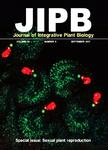Shifting Nicotiana attenuata's diurnal rhythm does not alter its resistance to the specialist herbivore Manduca sexta
Shifting Nicotiana attenuata's diurnal rhythm does not alter its resistance to the specialist herbivore Manduca sexta作者机构:Department of Molecular EcologyMax Planck Institute for Chemical EcologyHans-Knoell-Strasse 807745 JenaGermany Department of BiochemistryMax Planck Institute for Chemical EcologyHans-Knoell-Strasse 807745 JenaGermany German Centre for Integrative Biodiversity Research(iDiv)DeutscherPlatz 5e04103 LeipzigGermany EcologyDepartment of BiologyUniversity of KonstanzUniversitatsstrasse lOD 78457 KonstanzGermany KWS SAAT AGGrimsehlstrasse 31Postfach 146337555 EinbeckGermany Center for Genome EngineeringInstitute of Basic ScienceDaejeonKorea
出 版 物:《Journal of Integrative Plant Biology》 (植物学报(英文版))
年 卷 期:2016年第58卷第7期
页 面:656-668页
核心收录:
基 金:supported by funding from the Max Planck Society(all) the German Centre for Integrative Biodiversity Research(iDiv)Halle-Jena-Leipzig,funded by the German Research Foundation(FZT 118,M.C.S.) the Global Research Lab program(2012055546)from the National Research Foundation of Korea(Y.J.) a European Research Council advanced grant to I.T.B.(number 293926 I.T.B.,M.C.S.,S.-G.K.,and S.M.)
主 题:Circadian clock diurnal rhythm Manduca sexta Nicotiana attenuate plant-herbivore interactions
摘 要:Arabidopsis thaliana plants are less resistant to attack by the generalist lepidopteran herbivore Trichoplusia ni when plants and herbivores are entrained to opposite, versus identical diurnal cycles and tested under constant conditions. This effect is associated with circadian fluctuations in levels of jasmonic acid, the transcription factor MYC2, and glucosinolate contents in leaves. We tested whether a similar effect could be observed in a different plant-herbivore system: the wild tobacco Nicotiana attenuata and its co-evolved specialist herbivore, Manduca sexta. We measured larval growth on plants under both constant and diurnal conditions following identical or opposite entrainment, profiled the metabolome of attacked leaf tissue, quantified specific metabolites known to reduce M. sexta growth, and monitored A/I. sexta feeding activity under all experimental conditions. Entrainment did not consistently affect NI. sexta growth or plant defense induction. However, both were reduced under constant dark conditions,as was M. sexta feeding activity. Our data indicate that the response induced by NI. sexta in N. attenuata is robust to diurnal cues and independent of plant or herbivore entrain- ment. We propose that while the patterns of constitutive or general damage-induced defense may undergo circadian fluctuation, the orchestration of specific induced responses is more complex.



